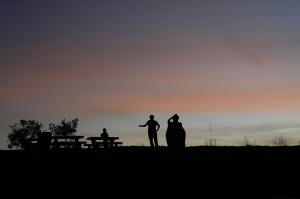As Israel advances on a Syrian buffer zone, it sees peril and
opportunity
 Send a link to a friend
Send a link to a friend
 [December 10, 2024]
By MELANIE LIDMAN [December 10, 2024]
By MELANIE LIDMAN
TEL AVIV, Israel (AP) — The dramatic downfall of Syrian President Bashar
Assad presents possible danger, and an opening, for neighboring Israel.
After fighting wars on multiple fronts for months, Israel is now
concerned that unrest in Syria could spill over into its territory.
Israel also views the end of the Assad regime as a chance to disrupt
Iran's ability to smuggle weapons through Syria to the Lebanese militant
group Hezbollah.
The Israeli military over the weekend began seizing control of a
demilitarized buffer zone in Syria created as part of a 1974 ceasefire
between the countries. It said the move was temporary and meant to
secure its border.
But the incursion sparked condemnation, with critics accusing Israel of
violating the ceasefire and possibly exploiting the chaos in Syria for a
land grab. Israel still controls the Golan Heights that it captured from
Syria during the 1967 Mideast war and later annexed — a move not
recognized by most of the international community.
Here’s a look at recent developments along the Syrian frontier.
Where are the Israeli troops?
Prime Minister Benjamin Netanyahu said Sunday that Israeli forces were
moving to control a roughly 400-square-kilometer (155-square-mile)
demilitarized buffer zone in Syrian territory. The buffer zone between
Syria and the Israeli-controlled Golan Heights was created by the U.N.
after the 1973 Mideast war. A U.N. force of about 1,100 troops has
patrolled the area since then.

On a visit Sunday to a Golan Heights hilltop overlooking Syria,
Netanyahu said that because Syrian troops had abandoned their positions,
Israel's move into the buffer zone was necessary as a "temporary
defensive position.”
“The peacekeepers at (the United Nations Disengagement Observer Force,
or UNDOF) informed the Israeli counterparts that these actions would
constitute a violation of the 1974 disengagement agreement, that there
should be no military forces or activities in the area of separation,”
said U.N. spokesman Stephane Dujarric. He added that the buffer zone was
calm and UNDOF peacekeepers remained in their position. The Security
Council is scheduled to meet for special consultations called by Russia
to discuss the buffer zone issue.
The rebels who ousted Assad and now control much of Syria are led by a
former senior al-Qaida militant, although he severed ties with the
extremist group years ago and has promised representative government and
religious tolerance.
On Monday evening, Netanyahu said Assad’s fall is the “direct result of
the heavy blows we landed on Hamas, on Hezbollah and on Iran.” He added
that Israel would occupy the summit of Mount Hermon, which is within the
buffer zone on the Syria-Lebanon border, and at 2,814 meters (9,232
feet) is the highest peak in the eastern Mediterranean coast.
Israel has sent troops into the buffer zone, including on the Syrian
side of snow-dusted Mount Hermon, which is divided between the Golan
Heights, Lebanon, and Syria. Only the United States recognizes Israel's
control of the Golan Heights.
How long will Israeli troops be in the buffer zone?
Israeli troops began moving into the buffer zone Saturday. Also on
Saturday, armed men attacked U.N. forces near the border with Israel,
according to Israeli Foreign Minister Gideon Saar.
“(The Israeli military) took targeted and temporary control of certain
areas near the border to prevent an Oct. 7 scenario from Syria,” Saar
said, referring to Hamas' surprise 2023 attack into Israel from the Gaza
Strip.

Dujarric also acknowledged Saturday's attack.
“Armed individuals climbed the wall of a U.N. position near Hadar,” he
said. “Following an exchange of fire with U.N. peacekeepers who were
protecting the position, the base was partially looted. There were no
casualties.”
UNDOF forces later recovered some of the looted items, “including a
number of the weapons and ammunition that had been taken,” he added.
[to top of second column]
|

People watch the sunset on Mt Bental near the so-called Alpha Line
that separates the Israeli-annexed Golan Heights from Syria, Monday,
Dec. 9, 2024. (AP Photo/Matias Delacroix)

Many in the region condemned the move. The Egyptian Foreign Ministry
accused Israel of “exploiting the power vacuum … to occupy more
Syrian territories and create a fait accompli in violation of
international law.”
Saudi Arabia separately criticized Israel for what it called its
“determination to undermine opportunities for Syria to restore its
security, stability and territorial integrity."
This isn’t the first time Israel has entered the buffer zone this
year.
An Associated Press report last month examining satellite imagery
found that Israel had been working on a construction project,
possibly a new road, along the border with Syria from as early as
July, and had in some cases entered the buffer zone during
construction. Following the AP report, U.N. forces warned that the
Israeli military has committed “severe violations” of its ceasefire
deal with Syria.
Is Israel invading Syria?
Israeli political and military leaders have stressed that the
seizure of the buffer zone is temporary and not a prelude to
entering other parts of Syrian territory.
“The plan at the moment is that this is a temporary step to make
sure stability is kept in the border, making sure the buffer zone is
kept, and the U.N. forces can stay,” said a military official, who
spoke on condition of anonymity in line with military guidelines.
The official noted that in 2014, U.N. peacekeepers fled the buffer
zone after al-Qaida-linked Syrian rebels attacked their encampments.
After armed men attacked U.N. forces over the weekend, Israel wanted
to ensure the situation did not repeat itself, the official said.
Israel isn’t currently trying to change the border or prepare for an
invasion into Syria, said Carmit Valensi, a senior researcher at the
Institute for National Security Studies, a Tel Aviv think-tank.
“Right now, it’s a tactical operation, not a long-term strategy, in
response to the dynamic situation in Syria,” she said. With the
collapse of the Syrian army, Israel wants to protect its borders
until the situation stabilizes, she said.
What are Israel’s interests?
Israel says its immediate goal is to prevent the instability in
Syria from spreading into the border region.

Defense Minister Israel Katz on Monday laid out Israel’s plans for
the border area. He said that after completing the takeover of the
buffer zone, Israel would create a “security zone” beyond it by
destroying heavy artillery across Syria and preventing Iran from
smuggling weapons through Syria into Lebanon.
Foreign Minister Saar said Monday that Israel has struck multiple
sites holding chemical weapons and long-range missiles to prevent
them from falling into the hands of hostile actors. Saar did not say
when the strikes occurred. Analysts said Israel is likely to
continue carrying out strikes against targets across Syria.
Israel is planning outreach to Syria’s Druze population, a
close-knit religious minority that also lives in Israel, Jordan and
Lebanon and has maintained some ties across borders.
Israel is also trying to open lines of communication with Syrian
rebel groups, to help ensure Iranian-backed factions don’t reclaim
any territory, according to Valensi.
For many years, Israel quietly provided food, medicine, clothing and
other assistance to war-ravaged southern Syria through “Operation
Good Neighbor,” which ended in 2018. More than 4,000 wounded and
sick Syrians received medical treatment in Israel or in Israeli
field hospitals, and those non-diplomatic connections could now
prove crucial.
___
Associated Press writers Edith M. Lederer at the United Nations and
Jon Gambrell in Dubai, United Arab Emirates, contributed to this
report.
All contents © copyright 2024 Associated Press. All rights reserved |